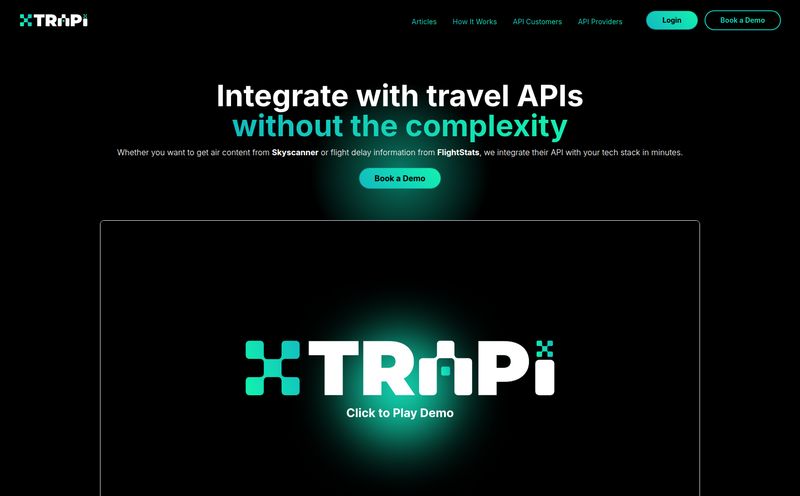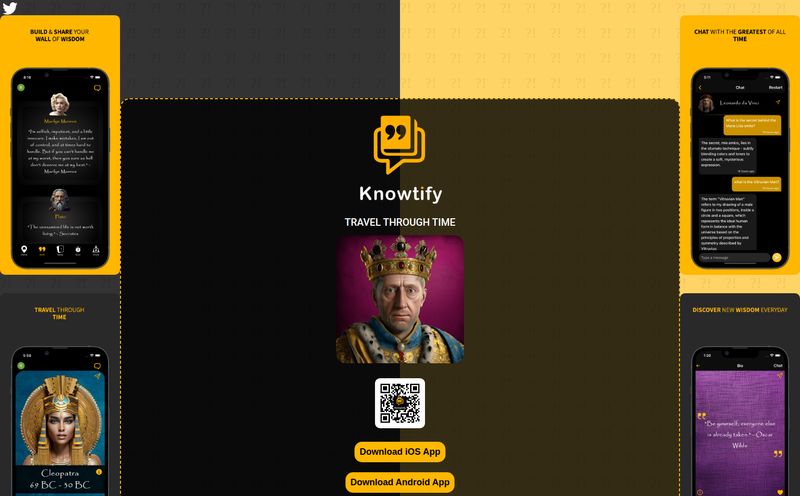Another day, another AI tool promising to change our lives. Honestly, at this point in my career, I've seen so many platforms claim to be the 'next big thing' that my skepticism has its own skepticism. Most of them are just repackaged productivity hacks or slightly fancier chatbots. But every once in a while, something pops up that makes me lean in a little closer to my screen. Something that isn’t just about making you do more, but maybe about helping you be better.
Enter wyd.ai. The name itself, a nod to the ubiquitous text message “what you doing?”, feels incredibly down-to-earth. It’s not called 'DecisionMatrix AI' or 'Optimus Self-Help'. It's just... wyd. And that's exactly the question it wants you to answer, but on a much deeper level.
So, is this just another piece of shiny tech destined for the digital graveyard, or is it a genuinely useful companion for the modern, over-stimulated mind? I decided to take a look.
So, What Exactly Is wyd.ai?
In the simplest terms, wyd.ai bills itself as an AI voice companion for personal reflection and better decision-making. Think of it less like Siri or Alexa, who are there to fetch facts and set timers, and more like a digital sounding board. It's a private space designed to help you untangle the messy knots of your own thoughts. You talk, it listens, and through some AI magic, it helps guide your reflection so you can arrive at your own conclusions.
I’ve always felt that the best solutions come from within, but getting them out is the hard part. It’s like trying to read the label from inside the bottle. We talk to friends, family, or partners, but sometimes they come with their own biases or we filter ourselves to manage their perception. The idea of a completely neutral, non-judgmental entity is... well, it’s pretty compelling.

Visit wyd.ai
My First Impressions and a Quick Walkthrough
Getting started is straightforward. But right off the bat, I hit one of the platform’s potential hurdles. To use it, you need to provide a phone number or an email. In this age of data paranoia, I know that’s a red flag for some. I get it. Giving your personal info to a new AI company feels a bit like a trust fall. But, for the sake of a good, honest review, I took the plunge.
Once inside, the interface is clean. Minimalist, even. It’s clear they want the focus to be on your thoughts, not on a dozen flashy buttons. The core experience is centered around voice. You speak your mind—dump your worries, outline a tough choice, confess your uncertainties—and the AI engages with you.
It's not giving you answers. Let's be very clear about that. Instead, it feels more Socratic. It asks clarifying questions. It might reframe what you've just said in a new light. It's the digital equivalent of a friend who, instead of saying “You should do this!”, says, “It sounds like this is really important to you. What’s the biggest fear you have about that option?” It’s subtle, but powerful.
How It Guides Your Decision-Making Process
Let's be real, decision fatigue is a genuine affliction for most of us. From what to eat for lunch to whether to switch careers, our brains are constantly overworked. This is where I think wyd.ai finds its groove.
The platform acts as a sort of structured thinking partner. It nudges you to look at a problem from different angles without explicitly telling you to. For instance, if you're agonizing over a job offer, you might ramble about the salary, the commute, the boss. A human friend might get stuck on one of those points. The AI, however, might gently prompt: “You’ve spoken a lot about the practical aspects. How does this role align with where you saw yourself in five years?”
See what it did there? It didn’t give advice. It just opened a door in your mind that you might have walked past. This is a far cry from the old-school chatbots some of us grew up with on AIM (shoutout to SmarterChild). This is a more nuanced application of AI, focused on augmenting your own intelligence, not replacing it.
The Good, The Bad, and The... AI?
No tool is perfect, and my job is to give you the full picture. So here’s my breakdown of the highs and the lows from my time with wyd.ai.
The Upside of an AI Confidant
The biggest pro, by a long shot, is the lack of judgment. You can be brutally honest with an AI in a way you might never be with another person. There's no fear of being a burden, no worry about shocking someone. This creates a space for a rare kind of clarity. It's available 24/7, which is more than you can say for most therapists or best friends. That 3 AM crisis of confidence? It’s there for you. It’s a unique approach to self-improvement that feels genuinely new.
Potential Sticking Points
Okay, let's talk about the cons. The need to hand over personal information at the door will be a deal-breaker for privacy advocates. The platform also requires JavaScript to run, which is standard for most modern web apps but a minor annoyance for the security-conscious who browse with it disabled. But the bigger, more philosophical question is: can an AI truly foster genuine reflection? Some would argue that empathy and shared human experience are essential for this kind of process. While the AI can simulate thoughtful questioning, it doesn’t feel anything. For some, that sterility might be a feature; for others, a bug.
AI as a Mental Wellness Tool: A Growing Niche
What wyd.ai is doing doesn't exist in a vacuum. It's part of a much larger trend of technology moving into the mental and emotional wellness space. We have meditation apps like Calm and Headspace that have become mainstream. There are therapy platforms like BetterHelp. As a Harvard Business Review article points out, AI is increasingly being used to help address the mental health crisis by providing accessible, scalable support.
Wyd.ai seems to be carving out a unique space for itself. It’s not meditation, and its not therapy, but it borrows from both. It's a pre-therapy tool, perhaps? A self-coaching platform? It’s for the everyday decisions and reflections that shape our lives but might not warrant a full therapy session. It’s a fascinating middle ground.
Let's Talk Money: The Pricing Situation
So, what does this futuristic friend cost? As of writing this, the pricing for wyd.ai is a bit of a mystery. Their site doesn't list any subscription tiers or fees. This isn't uncommon for a new tool that might still be in a beta phase or is trying to build a user base before monetization. My guess is we'll see a freemium model eventually, maybe with a few free sessions and a subscription for unlimited use. For now, it seems to be free to try, which lowers the barrier to entry—besides that phone number, of course.
Who is This Really For?
After playing around with it, I have a pretty clear picture of the ideal user. This is for the chronic overthinker. It's for the entrepreneur staring at a pivotal business decision. It's for the student trying to choose a major, or the creative person trying to work through a block. It’s for anyone who has ever wished they could just hit pause on the world and have a quiet, productive conversation with their own brain. If you find value in journaling but struggle to stay consistent, this could be a game-changer.
Frequently Asked Questions
Is wyd.ai a replacement for therapy?
Absolutely not. And that's important. This is a tool for self-reflection and decision support. It is not equipped to handle serious mental health crises. Think of it as a mental gym, not a hospital. Always seek professional help from a qualified therapist for mental health issues.
How is my personal data used?
This is the million-dollar question for any AI tool. According to most standard privacy policies, data is used to improve the service and is typically anonymized. However, you should always read the privacy policy of any service you sign up for. My advice is to be mindful and avoid sharing extremely sensitive identifiable information.
Can I use wyd.ai on my phone?
Yes, it's a web-based platform, so it should work on any modern browser, whether on your desktop or your phone. The voice-first approach actually feels very natural on a mobile device.
Is it just another fancy chatbot?
I'd say no. Most chatbots are designed to retrieve information or perform a task. Wyd.ai is designed to facilitate a process of introspection. Its goal isn’t to give you an answer, but to help you find your own. It's a subtle but critical difference.
What kind of decisions can it help with?
Anything from the professional to the personal. Should I take this job? Should I move to a new city? How can I be a better parent? How do I handle this conflict with a friend? If it’s a decision that requires weighing pros, cons, and emotions, it’s a good candidate.
My Final Thoughts on wyd.ai
I came in cynical, and I'm walking away... intrigued. Cautiously optimistic, even. Wyd.ai isn't going to solve all your problems for you. It's not a magic 8-ball or a digital oracle. But that’s not what it’s trying to be.
What it offers is a quiet, reflective space in a world that is anything but. It’s a tool that pushes you to engage with your own thoughts more deeply. It won't give you the answers, but it might just be the best tool I've seen for helping you ask the right questions. And in my experience, finding the right question is already half the battle won.
Reference and Sources
- wyd.ai official website: https://wyd.ai
- Harvard Business Review: How AI Is Helping to Address the Mental Health Crisis
- Psychology Today: On the nature of decision-making and fatigue



